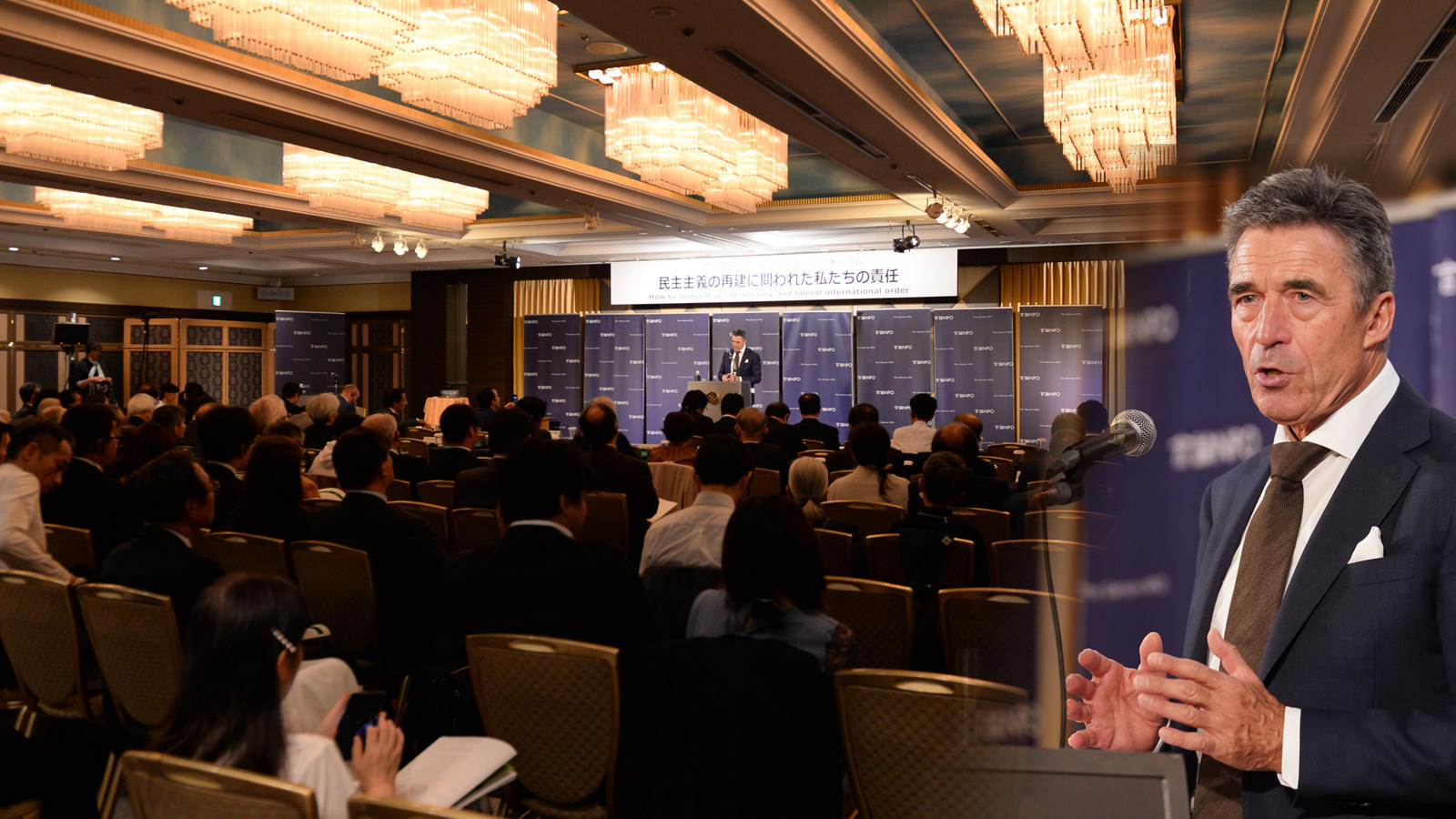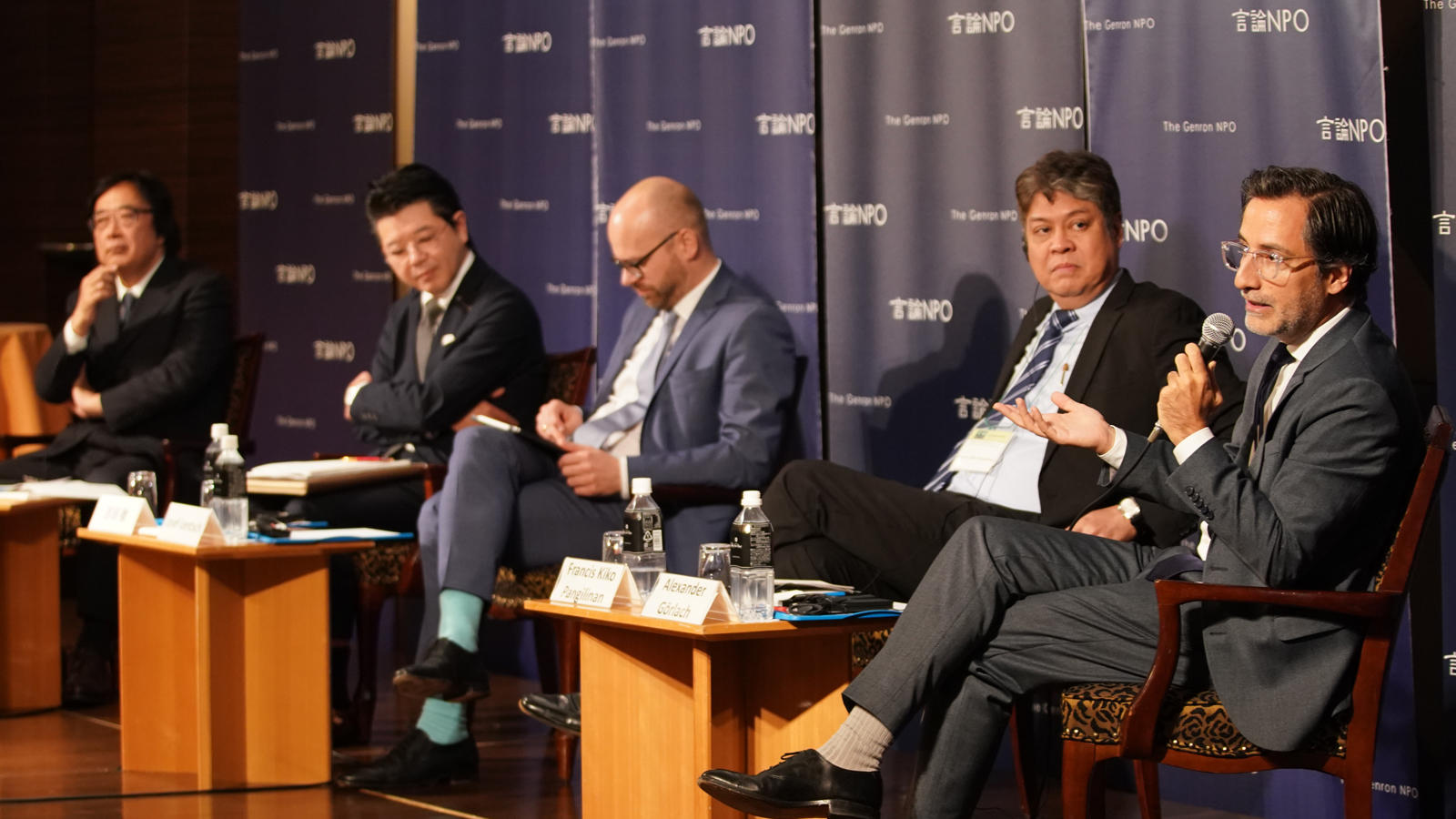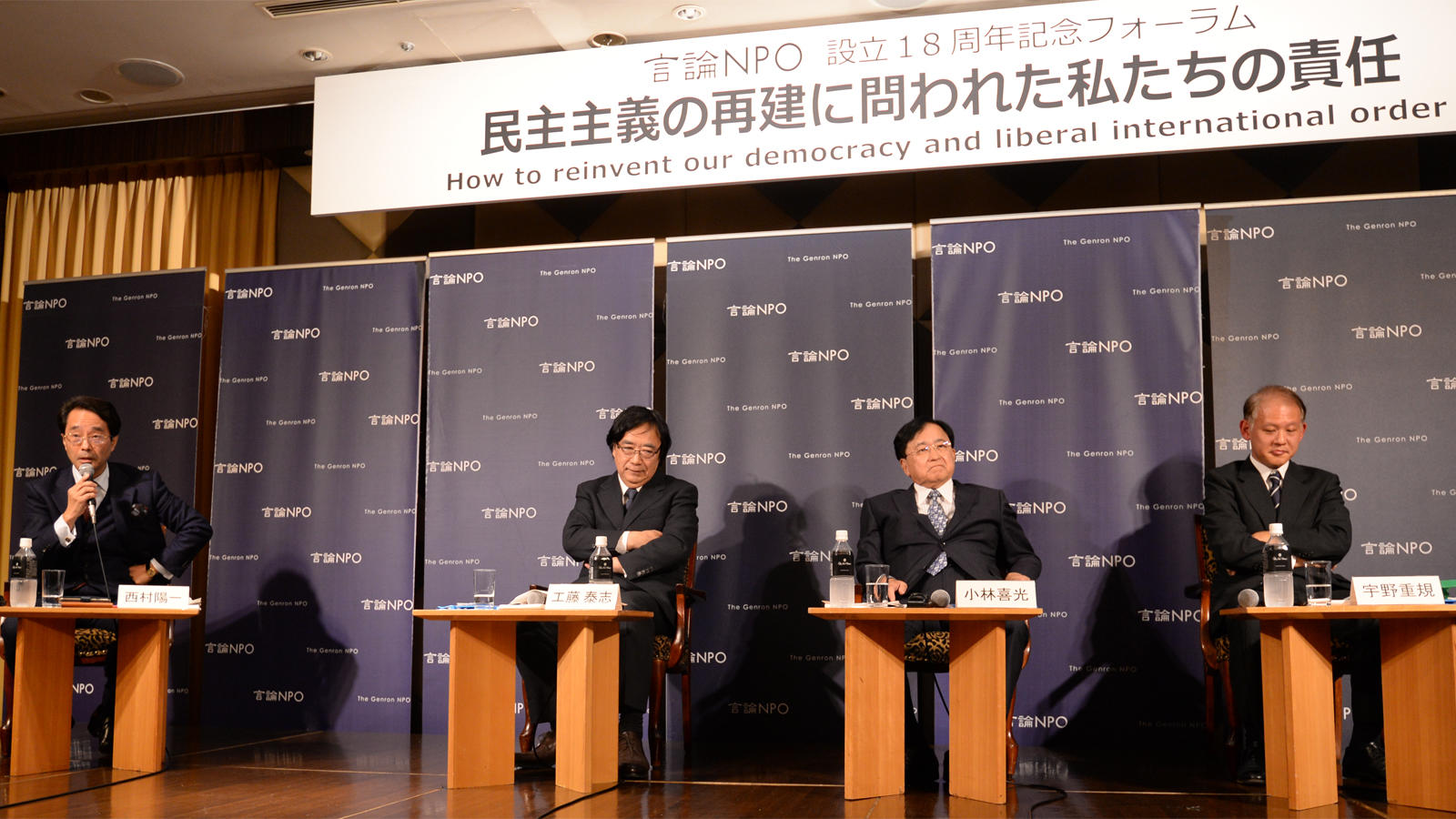Ladies and gentlemen, I'm delighted to be back in Tokyo and in Japan. I would like to thank our organizer, The Genron NPO and Mr. Kudo for inviting me to this important conference on democracy. During my years of public service, I have enjoyed coming to Japan. I was here as Danish Prime Minister in 2002 when I headed the European Union delegation for the EU Summit with Japan. In 2006, I came as Danish Prime Minister and I met Prime Minister Abe. And in 2013, I was here as Secretary-General of NATO.
For long, my home country, Denmark has worked for close links to Japan. Actually, in 1957, Scandinavian Airlines (SAS) opened a new connection to Japan shortening the flight time from 50 to 32 hours from Europe to Japan. I am very happy that the travel time now is even shorter having travelled here yesterday. As NATO Secretary-General, I strengthened cooperation with Japan. During my tenure, I wanted to strengthen NATO partnerships with democratic countries in other parts of the world. I saw democratic Japan as the natural fit for a global partner. In 2013, Prime Minister Abe and I cosigned a political declaration on NATO and Japan's shared interests and values during my visit to Tokyo. To me, it represented more than a simple agreement; it was a sign that freedom-loving democracies should stand together in the fight against autocracy.

Today, I will outline three important elements in the protection and promotion of freedom and democracy. Firstly, we need a strong relationship between Japan and Europe. Secondly, we need to develop a strong global alliance of democratic nations, including Japan. Thirdly, this alliance of democracies must become the global leader of new technologies.
First, strengthening the Japan-Europe cooperation.
Europe's historical ties across the Atlantic are strained. China poses an increasing challenge, but China represents also an opportunity. Europe must seek like-minded allies in the Pacific. Europe can have no better ally than Japan. The EU-Japan bond goes beyond interests; it is an alliance of shared values of freedom, democracy and open markets. Such values are under threat. The United States has decided to transact with the world rather than lead it with values. China challenges democracy in its neighborhood and rewrites the international rulebook designed to keep peace and global stability.
With the Chinese revisionist model on one hand, and the United States' global retreat on the other, Europe lacks the geopolitical strength and unity to assume America's position in defense of the rules-based multilateral order. Europe needs friends like Japan and we should strengthen that. We have laid important groundwork for cooperation. The recent EU-Japan free trade deal sends a signal to isolationists. With 74,000 EU companies exporting to Japan, 78 percent of which are smaller firms, and 550,000 people in the European Union employed by Japanese firms, this trade deal will strengthen a mutually profitable trading relationship.
We should build on this bilateral friendship in a number of areas of mutual interest.
For example, the World Trade Organization needs reform, but its core principles are sound. China seeks to rewrite these global rules so that its state-backed monoliths dominate industrial sectors across Asia, Africa and Europe. America has responded with trade wars that produce only economic losers. Europe and Japan have shown that hardnosed multilateralism can still work.
The key to our trade and investment relations should always be reciprocity - with China as well as with other countries. We want to trade with China, but on fair and equal terms, and without being naïve to how China is buying strategic assets and technological know-how. In Europe we have only just begun to wake up to this risk and become less naïve to the influence that China has built up in several EU Member States. I must credit Japan on this. Earlier than us, you were clear-eyed about the dangers of economic overexposure to China.
 Second, we need an alliance of the world's free and democratic nations.
Second, we need an alliance of the world's free and democratic nations.
2019 marks the 30-year anniversary of 1989. It was a year of momentous change. 30 years and exactly ten days ago, the Berlin Wall crumbled under the weight of the citizens' urge for freedom and democracy. The Iron Curtain fell. The Cold War ended in Europe.
Looking back to 1989, we shared a strong feeling of optimism. It was the 'end of history' so to speak, culminating in democracy and capitalism. Recent years and events have transformed us back into realists. Looking back to 1989, there were two defining events with relevance for Asia which foreshadowed where we are today. The Cold War never really seized its grip on Asia as it did in Europe.
In March 1989, Tim Berners-Lee made a first successful communication between a computer server and client. It was the birth of the World Wide Web and the internet. At first, we thought the internet would only have liberating effects. Russian election interference, circulation of disinformation, "deepfakes", and cyberattacks have demonstrated that it is not only benign information flows. Famously, in the year 2000, President Clinton compared Chinese efforts to control the internet with trying to hammer a jello to a wall with a nail. He meant: it can't be done. But China could. It is now firmly shielding the Chinese people behind its great firewall and controlling them with facial recognition. And it is even exporting its standards of internet censorship abroad.
Another defining moment of 1989 was inside China: the 4th of June 1989. The shootdown of students and bystanders by the Chinese People's Liberation Army inside the heart of their own capital. It was a short-lived period that the statue named the Goddess of Democracy - symbol of the students' aspirations - stood on Tiananmen. That event now stands as a 30 years' reminder that the Communist Party will do whatever it takes to stay in power in China - and to keep democracy out.
Increasingly, China and also Russia have taken a strong turn towards authoritarianism. They both demonstrate an increasing capability to interfere in democracies from elections to strategic investments. As we can read in our organiser; Genron's yearly poll of Japanese attitudes, close to one in two Japanese think that the current situation between China and the United States can be called a 'new Cold War'.
That is why we need to renew our commitment to freedom and democracy. And to a stronger Alliance of Democracies. It means that democracies such as Japan and the European democracies need to cooperate closer. We must make sure that it is the world's free societies that set the standards of the 21st Century on everything from trade standards, infrastructure and energy connectivity, 5G, artificial intelligence, and global communication.
We want to protect and promote freedom and democracy. That's why we must reinforce the voice and power of the democratic nations to counter the advancing autocracies.
For success in this, we need a determined US leadership, once again willing to lead - also on values. That is my vision with my Alliance of Democracies Foundation.
With that purpose, we host our yearly Copenhagen Democracy Summit where I hope to welcome many more Japanese participants next year 18-20 June. Our democracies are particularly challenged by how to handle technology such as 5G and artificial intelligence.
That brings me to my third point: we need a technological alliance of democracies.
For once I agree with Putin when he said that whoever becomes the artificial intelligence leader will lead the world. We must ensure the winner is the world's democracies, led by the United States working with democratic partners such as Japan and NATO.
Earlier this month, in Washington, I spoke at the National Security Commission on artificial intelligence chaired by Google's former CEO, Eric Schmidt and with other panelists such as Henry Kissinger to Mark Esper, the Defense Secretary. My takeaway is that the mood in Washington is on great-power competition with China - in particular on artificial intelligence. European and Japanese allies of the United States should take duly note.
We need to strengthen democratic cooperation to win the artificial intelligence race while setting global norms to prevent a race to the bottom. Firstly, we need to establish a Technological Alliance of Democracies to set norms and standards to regulate artificial intelligence. For example, the development of artificial intelligence challenges of traditional concept of warfare. I would argue that we should maintain a human touch in warfare and not leave lethal decisions to automated systems. In the best case, we could secure multilateral agreement on such principles.
Secondly, if we are to win the technological race, we need our private sector to cooperate with governments on this - across both the Atlantic and the Pacific to counter the challenge from autocracies.
Thirdly, we need to strengthen NATO by increasing European investments in research and development, and speeding up decision-making. Let me give you an example: When there was a conflict in Kosovo in the 90s, NATO took six months to make a decision on intervention. Later, when I was Secretary-General of NATO, the decision to defend Libya's citizens took six days. In a future with artificial intelligence, we may have six minutes - or even less. The use of autonomous weapons and artificial intelligence will drastically pressure decision-making by us, humans.
So, in the next years, with artificial intelligence, facial recognition and 5G, these challenges will become existential. In the 19th century, whoever controlled the seas controlled the world; in the 21st century, the world will be ruled by whoever controls digital channels.
It must be democracies. We cherish the principles upon which we have built our free societies. Let's make sure that these principles are defended and protected. But more than that, we have an obligation to broaden these principles to people suffering from suppression. All people are striving for personal liberty. They are striving for better life opportunities. They are striving for harvesting the benefits of freedom.
Let their dreams come through. Let's help them fulfil their hopes. We who are living in free societies have a special responsibility to protect and promote freedom and democracy.
In that global fight for freedom and democracy we need Japan. You have developed a strong and stable democracy. You have demonstrated how freedom can create progress and prosperity. You have shown how a democratic society lives in peace with its neighbors. Japan can showcase the strength of democracy to the whole world. Thank you.




Post a comment